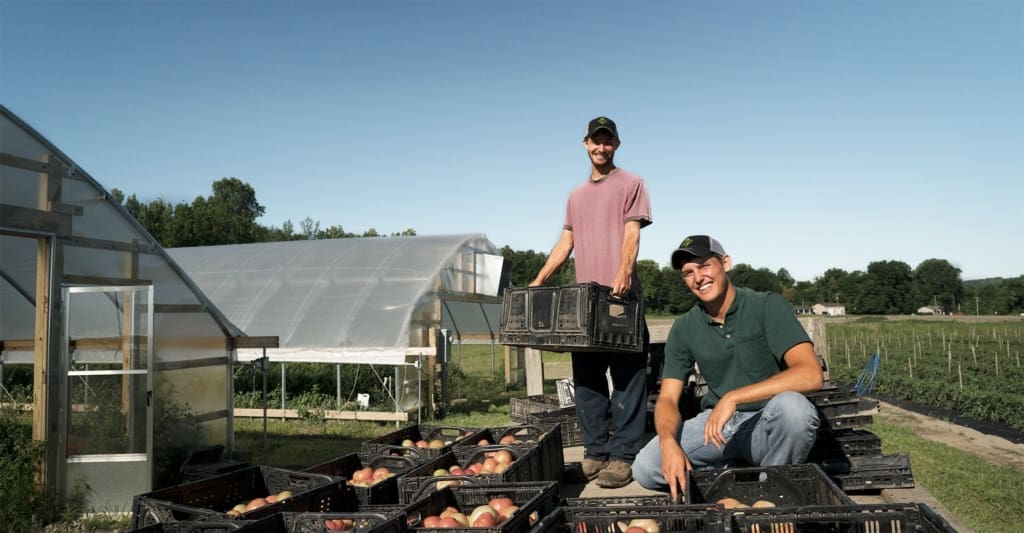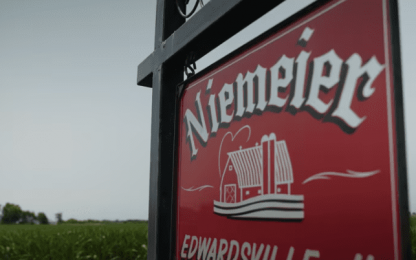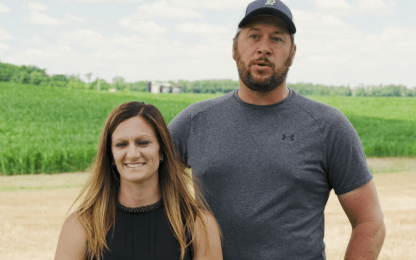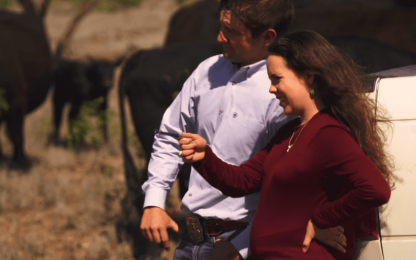Taylor and Zac Jones brought in their first harvest with just 278 tomato plants. Their grandfather had given them a couple rows in his garden and the pair had been experimenting with the idea of starting their own farm.
Although their grandfather had also given them two acres of tobacco, Taylor and Zac wanted to explore something new. “My farm management class at the University of Kentucky taught us to create budgets for crops,” says Taylor. “I did the budget for tomatoes and showed it to my professor because I thought I’d done something wrong. The profit margin for the tomatoes per acre was unbelievable.”
Even when they were farming a garden-sized plot of land, the two Farm Credit Mid-America customers used commercial production methods to learn exactly what they could get per acre. Now they grow a whole host of crops on their Warsaw, Kentucky, farm: tobacco, tomatoes, watermelon, sweet corn, pumpkins, alfalfa and beef. However, the road to diversification hasn’t been straightforward.
Making it work
During their first substantial tomato harvest, the brothers had to figure out how to market their product. They initially thought they would sell everything to one large chain grocery store, but that store didn’t buy as much as they planned. It was time for Plan B.
“We call it our Tommy Boy summer,” says Taylor. “Pretty much every day, we would load a truck as full as possible and drive with no idea where we would sell the tomatoes. We were really lucky because we always came home pretty much emptied out. Many of the customers we met along the way have stayed with us for six or seven years now.”
Despite surviving that season, which many would have viewed as a setback, Taylor and Zac kept looking forward. While slowly increasing tomato production on their grandfather’s land, the brothers began to build their cattle herd. By the third year, they were able to rent a few acres from a local nursery and plant watermelons and sweet corn. That autumn, they signed the papers on their own land.
Trying anything once
“Whenever we get asked to grow something or have an idea of what we’d like to try, the first step is to do the math and see if it can be profitable and work well within our operation,” says Zac.
“If we can come up with a plan to make money, we’re willing to try just about anything,” says Taylor. “We always try to be responsible with our ventures. With anything that’s new or relatively unknown, we try to keep our risk very low.”
Sometimes doing the math isn’t enough to know if something will work in the long run. One autumn, Taylor and Zac built a corn maze and pumpkin patch and invited the public to visit four days a week for an admission fee. Local schools planned field trips for the games and educational programming. The venture did very well and, in theory, could have been replicated in the following years. But it just wasn’t a good fit.
“Farming is extremely busy, but you can do it on your own schedule,” says Taylor. “With the corn maze, we had to be open at the hour we said we were going to be open. It really felt like a job. What we took from the corn maze was an appreciation for everything else we do. Farming is probably more labor-intensive and harder work than anything else we could do with our lives, but because we enjoy what we’re doing, it doesn’t feel like a job.”
“One of our favorite parts of farming is the freedom to change at any moment,” adds Zac.
Taking the next step
Branching out and trying new things may not always be easy but, regardless of the result, the brothers say experimentation is worth the trouble. “Ten years ago, if you had told me some of the things it was going to take to make farming work, I’m not sure I would have signed up for it,” says Taylor. “But I’m so glad we did.”
This year, Taylor and Zac added high-tunnel greenhouses to extend their tomato production season and increase yield. The brothers see this addition as almost a necessity: They grow tomatoes, so why not expand what they are already good at? Their next experiment is with industrial hemp. With this new crop, Taylor and Zac are implementing their tried-and-true method: Start small, take good notes and find the true potential.



